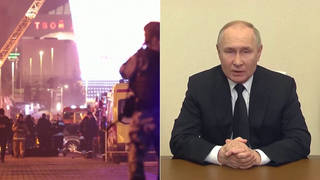
ISIS-K, an affiliate of the Islamic State, has claimed responsibility for an attack on a popular concert hall in Moscow that killed at least 137. Authorities say gunmen opened fire inside the Crocus City Hall building during a sold-out rock concert and then set part of the venue on fire. More than 100 people were injured in the attack, and many remain in critical condition. Authorities have detained 11 suspects, four of whom, all reportedly citizens of Tajikistan, are charged with terrorism and face life sentences. As more details emerge about the attack, we speak with professor of international affairs at The New School Nina Khrushcheva about the history of Muslim fundamentalist attacks in Russia and Putin’s “unfortunate” decision to ignore Western intelligence warnings about terrorist attacks. We’re also joined by longtime Moscow correspondent for The New Yorker Joshua Yaffa, who details possible motivations for ISIS-K and how Putin is attempting to fit this attack into his narrative opposing Ukraine and the West. “First and foremost, he cares about preserving his own power and the continued stability of his ruling system,” says Yaffa, who explains how Putin tries to control political blowback by equating ISIS-K with any group he opposes, including Alexei Navalny’s anti-corruption network and the so-called worldwide LGBT movement. “This is important to understand both in trying to determine how this attack happened in the first place and also what might Putin’s response be moving forward.”
This content originally appeared on Democracy Now! and was authored by Democracy Now!.